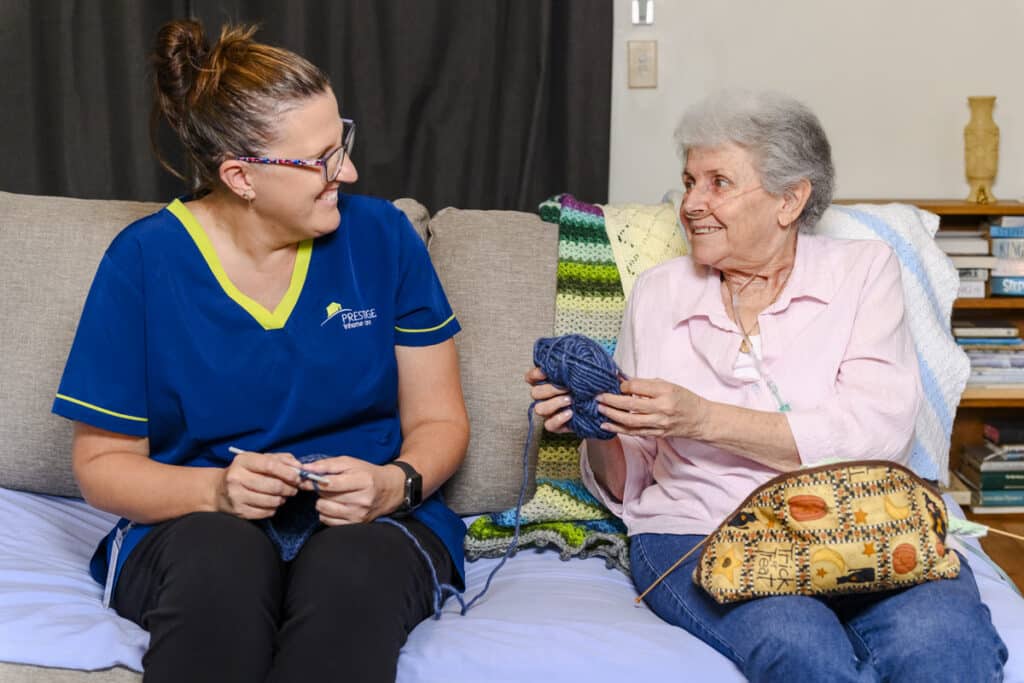Your Guide to Care Partners in the
Support at Home Program
Organising your aged care can feel overwhelming, especially when you’re trying access the right services, manage your budget and navigate the aged care system. That’s where Care Partners come in. They are your dedicated point of contact – someone who understands your goals and works alongside you to make sure your funding is used effectively and your needs are met.
What is a Support at Home Care Partner?
If you are approved to receive Support at Home, your provider, such as Prestige Inhome Care, will assign you a Care Partner. At Prestige, Care Partners are also known as Case Managers.
The primary role of a Care Partner is to ensure that the funding you receive is used effectively to connect you with the right services and products to address your individual needs. They work with you to decide what services you receive and how they will be delivered.
What Care Partners do to enhance Care Management
Care Partners and providers are responsible for:
- Identifying your individual needs and developing a care plan to address them
- Planning and coordinating services
- Monitoring, reviewing, and evaluating services and care plan outcomes
- Evaluating your budget and monitoring expenditure on an ongoing basis
- Providing support and education on accessing and understanding available care services and your eligibility
- Making referrals and facilitating access to allied health providers and third-party service suppliers, ensuring compliance and quality delivery
- Sourcing assistive technology or home modifications through the AT-HM Scheme (Assistive Technology and Home Maintenance), if you are eligible
- Supporting you through a care plan review and application for a higher level of support if your needs change
Want to understand more about Care Management? Visit the Department of Health, Disability and Ageing Support at Home Care Management page or contact Prestige Inhome Care to start your journey.
What to Expect When You Sign On
When you begin with your provider, you will work with your Care Partner or Case Manager to:

Develop Your Care Plan:
Your Care Partner will review your Support Plan (alongside the Notice of Decision) issued following your assessment. They will then consult with you on the development of a comprehensive and complete Care Plan.
This will incorporate the defined recommendations of the assessor’s support plan, addressing your goals and the strategies to achieve them. It will provide a detailed outline of the services to be delivered.
Confirm the services and supports you need:
Your Care Partner will recommend services tailored to your needs while ensuring your independence, dignity, and safety.

Understand your Service Agreement
and funding allocation:
Your Care Partner will ensure you understand your Service Agreement and explain how your funding will be distributed via your quarterly budget.
It’s important to note that 10% of your allocated Support at Home quarterly budget will automatically go towards Care Management, which covers the ongoing support and coordination provided by your Care Partner.
Case Study: Margaret’s Journey with Prestige Inhome Care
The following case study example demonstrates what the services of a Care Partner or Case Manager look like in practice.

Margaret, 78, had recently been approved for Support at Home funding. Living alone, she wanted to stay independent, but arthritis and early signs of dementia were making daily life difficult. When she engaged Prestige Inhome Care, she was introduced to Angela, her Care Partner.
Assessment and Planning
Angela met with Margaret to understand her goals: staying at home, managing pain, and coping with memory challenges. She created a care plan including physiotherapy, domestic assistance, meal support, and cognitive strategies.
Angela also provided a clear explanation of Margaret’s annual funding allocation of $15,000, ensured she understood her co-contributions and noted that 10% would be allocated to Care Management to cover ongoing coordination and support.
Coordinating Services
Angela arranged physiotherapy twice a week, scheduled a carer for domestic support and personal care, and introduced memory aids like medication reminders. She also sourced ergonomic kitchen tools for safety.

Review and Adjustments
Three months later reviewing the plan and checking in with Margaret, Angela added a weekly social outing and connected Margaret with a dementia-friendly group to reduce isolation.
Home Modifications
When eligible for the Assistive Technology and Home Modifications Scheme, Angela organised a bathroom upgrade and installed grab rails.
Outcome
Margaret remained safely at home with tailored physical and cognitive support. Regular reviews with Angela ensured her evolving needs were met and her funding used effectively.
How Prestige Care Management Makes a Difference
At Prestige, our Case Managers additionally focus on ensuring you receive the maximum value from your budget and the quality provision of your services.
When you choose Prestige Inhome Care as your provider, your services are supported by a team of Client Coordinators who are responsible for scheduling carers, following up on your requests, and ensuring smooth day-to-day delivery of care. They act as an additional point of contact for any changes or queries, working closely with your Case Manager to keep everything running seamlessly.
Ready to experience the difference a dedicated Prestige Case Manager can make?
At Prestige Inhome Care, we’re committed to helping you live safely and independently with quality, tailored support that maximises your funding and meets your unique needs.
Call one of our friendly team members today to schedule a no-obligation consultation on 1300 10 30 10.
Visit www.prestigeinhomecare.com.au/service/support-at-home to learn more about
Support at Home with Prestige Inhome Care.
